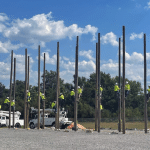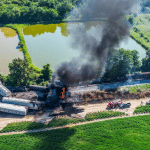The Mississippi Gulf Coast will receive a portion of a large sum of federal dollars going to several regions of the country to address fishery disasters that occurred from 2017 to 2022.
U.S. Secretary of Commerce Gina M. Raimondo last Monday announced that $42 million will be dispersed among seven different territories, with the Magnolia State receiving $2,993,283 of the pot.
Mississippi’s portion of the funding follows devastation to aquatic species that occurred nearly five years ago due to multiple openings of the infamous Bonnet Carré Spillway, reaping harsh financial ramifications on commercial businesses reliant on the Coast’s abundance of fish, shrimp, and oysters.
In 2019, Mississippi River levels were predicted to rise to a minor flood stage in New Orleans, La. The Bonnet Carré Spillway was opened on February 27 and again on May 10 for a total of 123 days. The Spillway had never been opened twice in one year and never for such a long period.
Polluted water from the Spillway is contended to have killed more than 90 percent of oysters on Mississippi harvest reefs. Shrimp landings were reduced by 50 percent due to large quantities of fresh water from the Mississippi River being introduced into the Mississippi Sound.
Governor Tate Reeves in 2021 wrote a letter to Raimonodo requesting disaster relief over the loss of shrimp and oysters in the Sound. Federal officials approved the funding last June and have now made it available to the state.
While any assistance to rectify the damage that was done to aquatic populations and the economy on the Gulf Coast is welcome, U.S. Senator Roger Wicker, R-Miss., says it should not have taken so long for Mississippi to receive aid from the federal government.
“This funding is helpful, but it does not make the impacted businesses whole. It should not take years for disaster funds to trickle in,” Wicker said. “I will keep working to reform the fisheries disaster declaration process so the funds can be delivered to communities in a shorter timeframe. I am committed to helping Mississippi recover no matter how long it takes.”
The full list of how the $42 million will be divvied out can be found below:
- Louisiana Saltwater Finfish, Oyster, and Shrimp fisheries ($19,701,988)
- Louisiana Saltwater Finfish, Oyster, and Shrimp ($7,450,423)
- Oregon Chinook Salmon Fisheries ($7,050,722)
- Mississippi Shrimp and Oyster Fisheries ($2,993,283)
- California Red Sea Urchin Fishery ($1,648,366)
- Alaska Yukon River Salmon Fisheries ($1,594,841)
- Muckleshoot Indian Tribe Coho, Chum, and Pink Salmon Fisheries ($1,218,502)
- Yurok Tribe Chinook Salmon Fisheries ($405,778)
In the coming months, officials with the National Oceanic and Atmospheric Administration will work with the states and tribes receiving allocations to administer the disaster relief funds.







